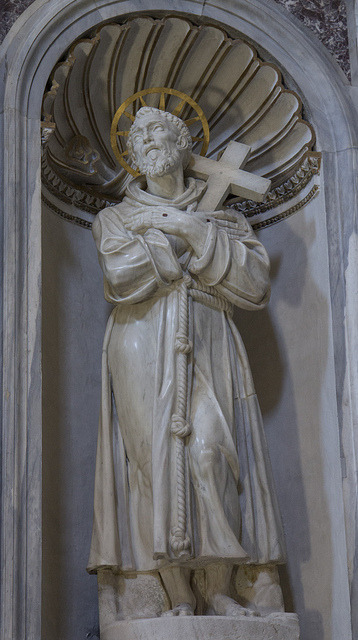
HOMILY for St Francis of Assisi
Gal 6:14-18; Ps 15; Mt 11:25-30
Pope Francis, when asked why he took the name of today’s great saint as his papal name, said that “Francis was a man of peace, a man of poverty, a man who loved and protected creation”. And those are the three hallmarks for which St Francis is well-known; rightly so. But for some, St Francis is depicted as the perfect saint for our time, an antidote to all of our contemporary ills: warfare and inter-religious violence, capitalist excess, and environmental change and ecological crises. Thus, Francis becomes appropriated as a pacifist, a nature mystic, and eco-warrior.
We should beware of such caricatures and mythologizing of Francis, lest we fail to see his real sanctity; we can be so dazzled by the effects that we don’t see their cause.
Today’s readings for the feast of our saint point out the source of St Francis’ holiness, which is a complete conforming of his life with Christ’s, so much so that he received the sacred stigmata. And because of this love for God, he also loved God’s creation, and above all, his fellow Man especially the poor and vulnerable. Hence Pope Francis said this morning in Assisi, “St Francis teaches us respect for the human person, who is the centre of God’s creation”.
However, although we tend to focus on St Francis’ works of social justice, this is an unbalanced picture. For in a saint justice for mankind is always balanced with justice toward God, so that the saint is just in all respects. Indeed, it is justice towards God, love for God, which grounds and makes possible justice and love for our neighbour. So, how is justice and love towards God expressed? The actual writings of St Francis, which I want to draw attention to on his feast day, make clear that justice towards God is found in the virtues of religion, which is about giving to God what is his due, namely, worship and reverence. For St Francis this was directed especially towards the Eucharist.
It is notable that our saint of the poor and of peace, our lover of nature, never had harsh words for those who wrought war, or destroyed the environment, or even oppressed the poor. That is a Francis invented for our modern-day needs. The real St Francis expressed his anger and strongest language for those who do not venerate the Eucharist with humility. As the Dominican historian, fr Augustine Thompson notes: “The locus of Francis’s ‘mysticism’, his belief that he could have direct contact with God, was in the Mass, not in nature or even in service to the poor”.
Thus, in a letter to the leaders of the Franciscan Order, he said: “[R]evere above all else the most holy Body and Blood of our Lord Jesus Christ… [The clergy] should hold as precious the chalices, corporals, appointments of the altar, and everything that pertains to the sacrifice. If the most holy Body of the Lord is very poorly reserved in any place, let It be placed and locked up in a precious place according to the command of the Church. Let It be carried about with great reverence and administered to others with discernment… When It is sacrificed on the altar by a priest and carried anywhere, let all peoples praise, glorify and honour on bended knee the Lord God living and true”.
At a time when the clergy only bowed after the Elevation of the Host, St Francis the deacon was a leader in the lay initiative of kneeling during Mass, and he was quite insistent on having the priest genuflect after the Consecration. Hence, he said: “I implore all of you brothers to show all possible reverence and honour to the most holy Body and Blood of our Lord Jesus Christ”. So, when we kneel and genuflect before the Eucharist, we honour St Francis’ dearest wishes.
And in his letters and actions, St Francis expressed his desire that the altar linens, the churches, and every thing set aside for the Mass be clean, beautiful, and of the best quality possible. Indeed, he even told his friars, with their miserable poor habits, to present precious silver containers to the secular clergy in which they could reserve the Eucharist. What an incongruous but powerful sight that would have been, showing us that we should spare nothing in our love for God in the Eucharist, for from this flows our love for the rest of God’s creation. Such Eucharistic love, surely, is the source of our saint’s holiness, the cause of all he did.
learning-catholic reblogged this from lawrenceop
 alwaysabeautifullife liked this
alwaysabeautifullife liked this acatholicrose reblogged this from lawrenceop
casandraenlamuralla-blog liked this
edmundofthewest reblogged this from lawrenceop
sieggthewolfbun liked this
lawrenceop posted this